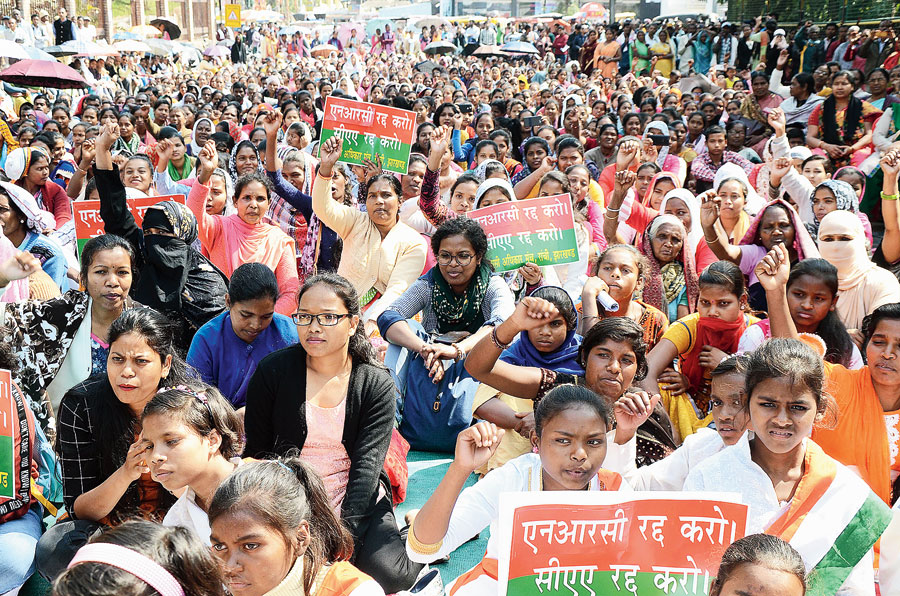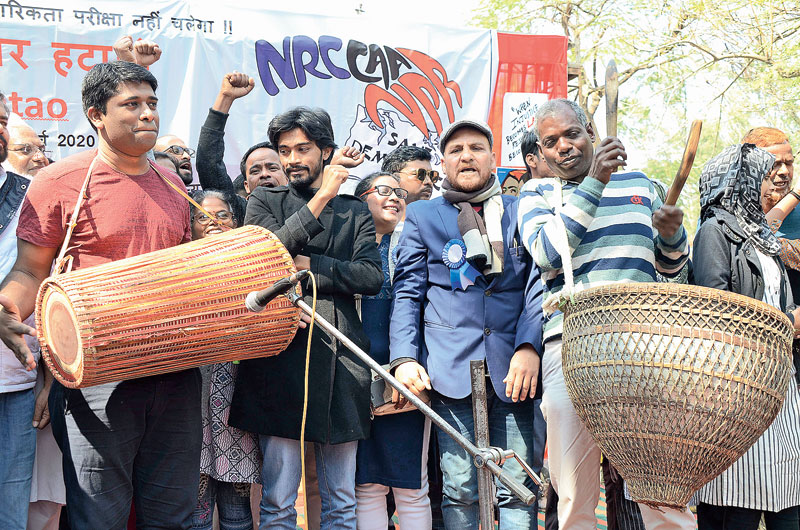Sab yaad rakkha jayega (Everything will be remembered) — the poem that Roger Waters, frontman of the legendary British rock band Pink Floyd, recited an English translation of in London recently — reverberated in the Jharkhand capital on Thursday.
Aamir Aziz, an engineer turned filmmaker, recited the poem — that he wrote in the aftermath of the recent mob violence targeting Jawaharlal Nehru University students — near Raj Bhavan in Ranchi on Thursday afternoon at a rally against the new citizenship matrix.
Waters had recited the poem at another protest rally in London a fortnight ago that was organised for demanding release of Wikileaks founder Julian Assange. “This guy has got a future,” Waters, an outspoken musician who has rallied against despots and oppressive regimes across the globe, had said about Aziz.
“I also learnt about his recital through social media,” Aziz, 30, told The Telegraph on the sidelines of Thursday’s rally, adding that Vijay Prashad — a Marxist intellectual — had translated it into English.
The poem has become an anthem at the protests against the new citizenship matrix — the Citizenship Amendment Act (CAA), National Register of Citizens (NRC) and the National Population Register (NPR).
The over-500 audience, many of them wearing black headbands with “No NPR, No CAA, No NRC” written on them, burst into an applause as Aziz recited: Tum zameen par zulm likho, Asman me inqilab likha jayega (You write injustice on the earth, We will write revolution in the sky).
Aziz also recited another of his poems, Main inkaar karta hun (I deny), at the rally that was organised by Jharkhand Janadhikar Mahasabha, an umbrella organisation of progressive groups, and supported by about 30 other civil society and political outfits.
Among the speakers who addressed the rally that lasted for over three hours was Kannan Gopinathan, an alumnus of BIT Mesra who resigned from the Indian Administrative Service (IAS) last year in protest against restrictions imposed in Jammu and Kashmir following the abrogation of Article 370.
The former IAS officer explained how people, without knowing the real issues and their consequences, agree to certain things — be it weeding out black money or driving out infiltrators.
“The government must first spell out what it intends to,” Gopinathan said.
He pointed out that the experience in Assam, the only state where the NRC has been implemented, has been disastrous. The government also once said it wouldn’t implement NRC is but going on with it starting with the NPR exercise, he pointed out.

The participants.
“It's not a Hindu-Muslim issue either as 12 lakh out the total 19 lakh people kept out of the NRC in Assam were Hindus,” Gopinathan pointed out.
The poor and the homeless would be the worst sufferers of any such nationwide exercise, he stressed.
He said. “The government said abrogation of Article 370 would bring in development (in Kashmir) but was there proper development in Jharkhand where Article 370 never existed?”
He thanked the protest organisers for inviting him. “It’s nice to be back in Ranchi where I studied engineering.”
CPI-ML MLA Vinod Singh, who also addressed the rally, said the NPR exercise beginning on April 1 would be the first step towards the NRC.
“I attempted to initiate a discussion in the Assembly but the Opposition didn’t allow the House to do business,” Singh said.
“Jharkhand would be one of the most affected states if NRC is imposed,” he said, adding that the state has a lot of poor, Dalits and tribals who would be easy targets.
The speakers at the protest insisted that the state government must stop the NPR exercise and pass a resolution in the Assembly as some other states have done.
The organisers also wrote a letter, addressed to chief minister Hemant Soren and signed by representatives of participating organisations, requesting him to stop the NPR in the state.
“We appeal to you to ensure that the government of Jharkhand immediately issues an order to stop all NPR-related activities in the state,” the letter said, adding that the state government should also act to get the NRC and the CAA repealed.
On Thursday evening, Aziz and Gopinathan also met and expressed solidarity with the women protesting at Kadru non-stop for 46 days against the new citizenship matrix.
A delegation that included Gopinathan, MLA Singh and economist Jean Dréze also met the chief minister and urged him to stop the NPR exercise in the state.
Hemant said the government was seeking expert opinion and would soon take a decision, said Nadim Khan who was in the delegation.










